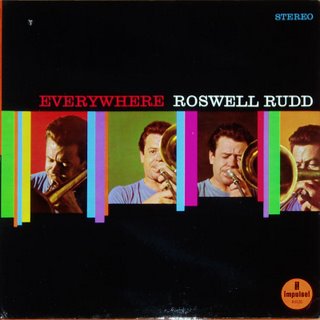
ROSWELL RUDD
Everywhere
impulse! A-9126 Stereo
Recorded 1966
Side One
1. Everywhere
2. Yankee No-How
Side Two
1. Respects
2. Satan's Dance
PERSONNEL
ROSWELL RUDD; trombone
GIUSEPPE LOGAN; flute, bass clarinet
LEWIS WORRELL; bass
CHARLES HADEN; bass
BEAVER HARRIS; drums
ROBIN KENYATTA; alto sax
Perhaps best known for his association with Archie Shepp, trombonist Roswell Rudd started playing in a traditional jazz context with players like Buck Clayton. He also played with another trad-cum-free jazzer that's popular on these pages, Steve Lacy. He got heavily involved with the New York avant-garde scene of the early 1960s, playing with John Tchicai in the New York Art Quartet as well as with Cecil Taylor. That led to an association with Archie Shepp that lasted for much of the 1960s, Rudd being responsible for some of Archie's finest moments, including my personal favourite, his arrangement of 'Naima' on the 'Four For Trane' LP.
This 1966 LP was Rudd's first as leader, amazingly, and features several other notable figures from the jazz avant-garde. Beaver Harris had contributed drums to several Archie Shepp recordings with Rudd, and Charlie Haden had, of course, played with the great Ornette Coleman.
The album opens with the title track, Rudd's poignant melody arising from a sea of sound dominated by the sinister tones of Haden's bowed bass. The track seems to grow from there - like a living thing rather than a classically structured jazz composition. It's most definitely a group improvisation, with no discrete solos as such, the players slithering around and occasionally bumping into each other. It's a marvellously restrained piece of music, and one of the best pieces of free jazz I've heard in a long time.
The remaining three tracks on the album are all in a similar vein, being faster paced and less controlled than 'Everywhere'. The playing is still good, but the listening is much more difficult, with some pretty intense sections. In some passages the rhythm section loses it's pulse and goes nowhere, fast, which is not good to hear. Haden comes to the rescue somewhat during 'Respects'', setting the tone with an insistent bass riff that recurs in parts throughout the piece.
Rudd continues in a free-jazz inspired vein to this day. There is a comprehensive discography available here that allows the interested listener to follow his career in great detail.


1 comment:
thanx
Post a Comment